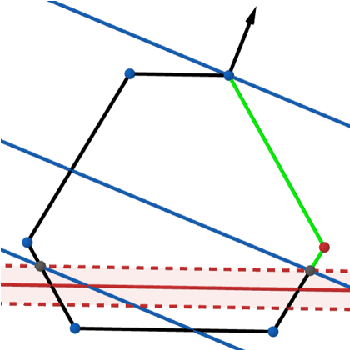Phuong Dinh Mai
Towards Efficient Pareto-optimal Utility-Fairness between Groups in Repeated Rankings
Feb 22, 2024



Abstract:In this paper, we tackle the problem of computing a sequence of rankings with the guarantee of the Pareto-optimal balance between (1) maximizing the utility of the consumers and (2) minimizing unfairness between producers of the items. Such a multi-objective optimization problem is typically solved using a combination of a scalarization method and linear programming on bi-stochastic matrices, representing the distribution of possible rankings of items. However, the above-mentioned approach relies on Birkhoff-von Neumann (BvN) decomposition, of which the computational complexity is $\mathcal{O}(n^5)$ with $n$ being the number of items, making it impractical for large-scale systems. To address this drawback, we introduce a novel approach to the above problem by using the Expohedron - a permutahedron whose points represent all achievable exposures of items. On the Expohedron, we profile the Pareto curve which captures the trade-off between group fairness and user utility by identifying a finite number of Pareto optimal solutions. We further propose an efficient method by relaxing our optimization problem on the Expohedron's circumscribed $n$-sphere, which significantly improve the running time. Moreover, the approximate Pareto curve is asymptotically close to the real Pareto optimal curve as the number of substantial solutions increases. Our methods are applicable with different ranking merits that are non-decreasing functions of item relevance. The effectiveness of our methods are validated through experiments on both synthetic and real-world datasets.
 Add to Chrome
Add to Chrome Add to Firefox
Add to Firefox Add to Edge
Add to Edge